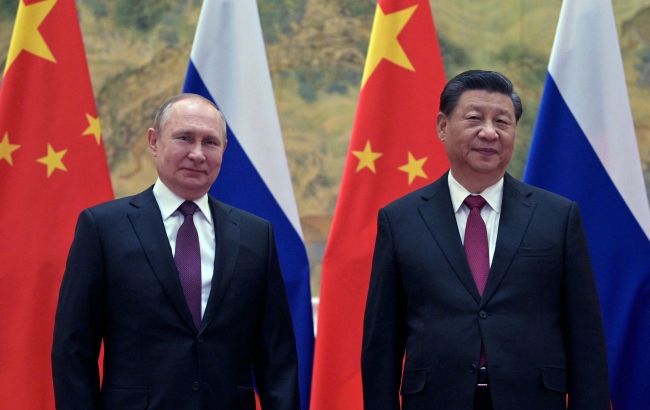Jeddah summit shows China's disagreement with Russia over war in Ukraine, ISW
 Illustrative photo: Russian dictator Vladimir Putin and Chinese leader Xi Jinping (Getty Images)
Illustrative photo: Russian dictator Vladimir Putin and Chinese leader Xi Jinping (Getty Images)
During the summit in Jeddah, Saudi Arabia, held on August 5-6, Beijing's growing disagreements with Moscow over the resolution of Russia's full-scale war against Ukraine became evident, particularly in the Kremlin's interests, according to conclusions drawn by analysts at the Institute for the Study of War.
The Financial Times reported Chinese representatives at the Jeddah meeting as being "constructive" and "keen to show that [China] is not Russia." The Financial Times quoted one European diplomat present at the talks as saying that the "mere presence of China shows Russia is more and more isolated."
The Chinese delegation reportedly indicated its willingness to attend the next meeting of a similar format that will likely also exclude Russia.
A Russian insider source alleged that Russia has rejected China's 12-point peace plan for the war in Ukraine from February 2023 (which the Chinese delegation re-introduced during the talks in Saudi Arabia) and that some Chinese elites are secretly expressing their dissatisfaction with the actions of the Russian leadership regarding a peaceful settlement of the war in Ukraine.
According to the ISW report, the information about the negotiations in Saudi Arabia and the claims by insiders, if true, aligns with previous ISW assessments that China does not fully support Russia on the Ukraine issue.
Furthermore, this also indicates analysts' belief that Russia and China’s relationship is not a “no limits partnership” as the Kremlin desires.
Key takeaways:
- Ukrainian forces continued counteroffensive operations on at least two sectors of the front on August 7.
- Russian forces and occupation administrators continue to seek to mitigate the impact of recent Ukrainian strikes on logistics nodes along key Russian ground lines of communication (GLOCs) connecting occupied Crimea with the occupied Kherson region.
- Russian opposition media outlet Verstka suggested that the Russian Investigative Committee and its head, Alexander Bastrykin, are directly involved in the forced deportation of Ukrainian children to Russia and the forced placement of Ukrainian children into Russian military training programs.
- The Ukrainian delegation at the talks in Saudi Arabia presented a 10-point peace plan that reportedly included calls for global food security, nuclear safety, environmental security, humanitarian aid, and prisoner releases.
- Ukrainian officials reported that Ukrainian and Russian forces conducted a prisoner-of-war (POW) exchange on August 7.
- Russian forces conducted offensive operations along the Kupyansk-Svatove-Kreminna line, near Bakhmut, along the Avdiivka-Donetsk City line, along the Donetsk-Zaporizhzhia region border, and in the western Zaporizhzhia region on August 7 and made advances in certain areas.
- The Kremlin continues efforts to portray itself as adequately mobilizing the Russian defense industrial base (DIB) for a protracted war effort.
- Russian occupation authorities continue to use maternity capital benefits to coerce Ukrainian civilians in occupied territories to accept Russian citizenship and increase social control in occupied areas.
Ukraine Summit in Saudi Arabia
Recalling the two-day summit in Saudi Arabia on August 5-6, the main focus was the Ukrainian "peace formula." Representatives from over 40 countries were invited to the summit, including India, Brazil, Indonesia, Egypt, Mexico, and China.
Andriy Yermak, Head of the Office of the President of Ukraine, stated after the summit that while some representatives held differing views, all countries demonstrated commitment to the principles of the United Nations Charter, international law, and respect for sovereignty and territorial integrity.
A representative of the U.S. State Department, Matthew Miller, deemed China's participation in the summit productive.

